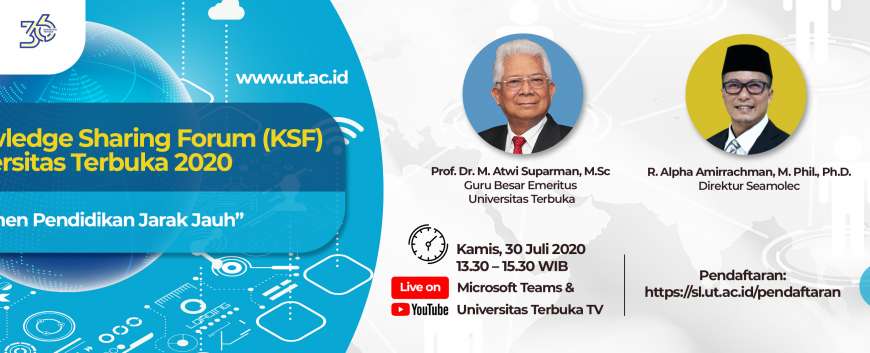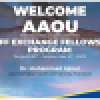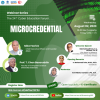- Posted by Hanna Hanifa Varda
- 30 Jul 2020
- PUSAT
- Total View 0
UT Held Series of Knowledge Sharing Forum 2020
Covid-19 Pandemic, which has yet to alleviate in Indonesia, does not diminish the vigor of the civitas academica of Indonesian Open University or Universitas Terbuka (UT) to continue to improve their understanding and dissemination of the knowledge of the System, Technology, and Management of Distance Learning Programs for all lecturers, students, and the public in general. It is proven with the convention of the UT’s Knowledge Sharing Forum (KSF) 2020 virtually through Microsoft Teams covering a number of topics regarding Open, Online and Distance Learning.
At the end of July, a series of KSF activities entered its tenth round with the theme of "Distance Education Management" held on Thursday (30/7/2020). This time, KSF invited two resource persons; they are Emeritus Professor of the Indonesia Open University, Prof. Dr. M. Atwi Suparman, M.Sc., and Director of SEAMEO Regional Open Learning Centre (SEAMOLEC), R. Alpha Amirrachman, M.Phil., Ph.D. The program was moderated by the Secretary of the Institute of Education Quality Development and Assurance of Indonesia Open University or Lembaga Pengembangan and Penjaminan Mutu Pendidikan (LPPMP-UT), Drs. Jamaludin, M.Si.
Atwi, who was also a former Rector of UT, said that in any education institutions, there should be administrator who can facilitate the interaction among the participants or students, the tutors, and the administrators. Interaction is the key in order to continue to maintain the quality in delivering the objectives of distance education. He also emphasized that the development of learning materials should be managed by a dedicated department of research and development so that the quality provided can be assured.
The other speaker, Alpha, explained that SEAMOLEC has played its roles in widening education opportunity as well as in providing and distributing education quality more evenly. The success of Web-based Learning System (Elearning) is determined by the availability of platform specifically designed for online learning, the collection of learning materials, and the successful implementation of online learning. SEAMOLEC also facilitates the participants of online open learning courses.
For information purpose, a number of KSF activities have been conducted thus far. On Tuesday, (12/5/2020), the first KSF presented Expert Staff for Academic Affairs from Ministry of Research and Technology/National Agency for Research and Innovation (Kemenristek/BRIN), Prof. Dr. Paulina Pannen, M.Ls, Head of Center for Foreign Students Administration of LPPMP-UT, Dra. Dewi Artati Padmo Putri, M.A., Ph.D., and Head Lector as well as former UT’s Vice Rector I, Dr. Yuni Tri Hewindati. The first KSF was moderated by Prof. Dr. Gorky Sembiring, M.Sc, taking a theme of “Integrating Technology in Learning: Learning Solution During Covid-19 Pandemic”. As many as 768 participants who followed this webinar were registered. The talk was focusing on the discussion that technology is not a tool that replaces the roles of educator and instead, it merely helps the learning and teaching processes. The selection of effective and efficient technology is needed in order to accomplish the expected targets.
The second series of KSF activities invited three speakers, who are Agus Putranto, S.Kom., M.Sc., Director of Universitas Bina Nusantara (BINUS); former UT’s Rector, Prof. Ir. Tian Belawati, M.Ed., and Dr. Kartono, S.Pd., M.Si (UT’s Expert Staff for Education Standardization and Program Innovation). Acting as the moderator was Dr. Agus Santosa, M.M. The second KSF was focused on the topic of “the Development of Online Learning System Design” and it was convened on Tuesday, 19 May 2020. The discussion focused on the online learning that should be applied with good preparation so that the learning process is effective. The preparation consists of learning system, learning design, and Learning Management System (LMS) which will be used.
Furthermore, on Friday (12/6/2020), the third KSF activity was held and bringing up the topic of “IT Architecture to Support Web Learning”. The third KSF invited and presented three speakers or resource persons. They were Education Lead Microsoft, Benny Kusuma; Dean of School of Pedagogy and Education of Indonesia Open University, Prof. Drs. Udan Kusmawan, M.A., Ph.D.; and Head of Technical Implementation Unit of Information and Communication Technology of Indonesia Open University, Dimas Agung Prasetyo, S.Kom., M.Sc. The program was moderated by Dr. Ake Wihadanto, S.E., M.T.
The outcomes of the third KSF gave a conclusion that the quality of online learning is certainly supported by the roles of IT architecture that can provide the ease of online education management process, strengthen the services flexibility, guarantee the user-friendly feature, and possess the sufficient amount of data storage capacity.
KSF series continued on Friday (19/6/2020). The fourth KSF brought up the theme on the Philosophical Foundation and Theory of Learning in Web. Three resource persons or speakers were present, namely Rector of Padang State University, Prof. Drs. H. Ganefri, M.Pd., Ph.D.; UT’s Vice Rector for Academic Affairs, Dr. Mohamad Yunus, S.S., M.A.; and UT’s Professor, Prof. Dr. Suciati, M.Sc. In the mean time, Dr. Ucu Rahayu, M.Sc. served at the moderator. The conclusion drawn from this 4th KSF is that the fundamental foundations of education are the education for all the elements in the society, upholding equity and fairness, and life time learning. The learning and teaching principles in distance education all refer to the learning interaction among the instructors or tutors, students, and materials.
Subsequently, the fifth KSF was also successfully organized on Friday (26/6/2020). This sequence of KSF series focused on the discussion regarding the Models and Strategies of Web-Learning Development by inviting and presenting three resource persons, namely Director of Learning and Student Affairs, Ministry of Education and Culture, Prof. drh. Aris Junaidi, Ph.D.; Head of Center for Sciences of the Institute of Education Quality Development and Assurance of Indonesia Open University (LPPM UT), Prof. Dr. Gorky Sembiring, M.Sc.; and Head of UT’s Technical Implementation Unit for Professional Development, Dr. Agus Joko Purwanto, M.Si. The event was moderated by Deputy Dean III of Faculty of Law, Social Science, and Political Science (FHISIP UT), Rahmat Budiman, S.S., M.Hum., Ph.D. The conclusion that can be drawn from the discussion was that the academic strategies that need to be developed in order to support the learning and teaching processes in distance education are learning materials, supporting media for the students and evaluation system. In distance learning, learning materials are also needed in digital and interactive forms, as well as good internet access support.
On Friday (3/7/2020), the sixth KSF was held by taking the theme of Massive Open Online Courses (MOOCs), Micro Credentials, Digital Badge: Obstacles, Supporters, and Prospects. Three resource persons present were University of Pradita’s Rector, Prof. Dr. Ir. R. Eko Indrajit, M.Sc., Mphil., MA.; Head of the Center for Open and Distance Education Research and Innovation, LPPM UT, Prof. Daryono, S.H., M.A., Ph.D.; and Head of the Center for Community Services of LPPM UT, Dr. Trini Prastati, M.Pd.; and in addition, Deputy Dean for Student Affairs and Cooperation, Faculty of Pedagogy and Education (FKIP UT), Dr. Siti Aisyah, M.Pd., was acting as moderator. The rapid technology development has provided free access for the people in general to broaden their knowledge and sciences according to their interest, which includes the use of MOOCs, Micro Credentials and Digital Badge as the tool or facility to access the content of direct learning from the experts in form of either free of charge services or paid services if certificate or badge is wanted.
Digital platform, such as MOOCs, Micro Credentials and Digital Badge also provides efficient and optimum opportunity to support the learning process so the certificates awarded can provide the recognition for expertise and open more employment opportunity. Continuing education, which is conducted virtually by UT through MOOCs, can provide both personal development and professional development for the society. For example, currently, UT opens Independent Course Program or Program Mata Kuliah Mandiri (PMKM), General Course Partnership or Kemitraan Mata Kuliah Umum (MKU) that can be accessed either through partnership or by individuals, and therefore, the programs can provide some experience in open and distance education.
Not long ago, as many as 5,200 participants also joined the seventh KSF activity which was held on 10 July 2020 by taking the theme of "Strategies to Improve Student Engagement in Online Learning," which presented three resource persons, namely Chief of the Presidential Staff Office, TNI General (Ret.) Dr. H. Moeldoko, S.I.P.; UT’s Rector, Prof. Ojat Darojat, M.Bus., Ph.D.; and Director of UT-Jember, Prof. Dr. Mohammad Imam Farisi, M.Pd.; who were moderated by the Director of the UT’s Center for the Development of International Relations and Partnership, Dr. Sri Sediyaningsih, M.Si.
In his presentation, Moeldoko focused on the process of education transformation which takes place during the pandemic of Covid-19 in Indonesia, which is to determine the objectives of effective online learning, even distribution of internet access, and use of language styles in accordance with the current market target that is millennial generation. In the mean time, Prof. Ojat emphasized that the distance education (PJJ) requires both communicative interaction and close interaction between the tutors and their students in professional way. This is in line with the increasing student engagement, so online learning and teaching processes can be more optimal. The last speaker, Imam, said that there are five interactive components in online learning, which are students, teaching materials, teachers, interaction with learning community, and the presence of learning processes. The students are the most essential part in online learning processes. UT equips its students with independent learning education insights before commencing online learning process at UT, effective ways of distance learning, ways to improve skills, and clinic workshops. These are intended to maintain the presence of the students in the online learning.
The eighth series of KSF events brought up the theme of “Learning Management in Web” which was held on Friday, 17 July 2020. The eighth KSF presented three resource persons, namely Head of Learning Resources Office of University of Indonesia, Drs. Gatot Fatwanto Hertono, M.Sc., Ph.D.; Vice Rector for Institutional Development and Cooperation Affairs of the Indonesia Open University, Dr. Liestyodono Bawono Irianto, M.Si.; and Head of the Center for Learning Assistance, the UT’s Institute of Education Quality Development and Assurance (LPPMP-UT), Ir. Anak Agung Made Sastrawan Putra, M.A., Ed.D. The program was moderated by the Director of Department of Education Science and Education Technology Management Study Program of Faculty Pedagogy and Education of Indonesia Open University (FKIP UT), Dra. Marisa, M.Pd.
Gatot explained a number of aspects that need to be prepared for the implementation of blended learning, namely good governance, quality assurance, human resources, learning materials, learning methods, as well as facilities and infrastructure. In response to the Covid-19 pandemic, he said that the UT’s students are already used to with independent learning through online tutorial programs. In the mean time, Liestyodono said that UT has also facilitated the students in coping with the limited internet access by preparing various alternatives of learning methods for the students, including among others, interactive digital teaching materials, iTutorials, audio modules, PDF modules, multimedia courseware, and others. The following speaker, Agung Sastrawan, added that, in addition to the learning system which is offered and provided fully online, UT also provides the blended learning modules, which are tutorial webinar (tuweb) on the basis of face-to-face platform through Microsoft Teams managed by Distance Learning Unit Program or Unit Belajar Jarak Jauh (UPBJJ) and it can be accessed in a cellular phone.
The ninth event of the KSF series was convened by taking the theme of “Quality Assurance of Online Learning,” on Friday (24/7/2020). Such KSF event presented the experts in education quality assurance, namely the Executive Board of the National Board for University and College Accreditation or Badan Akreditasi Nasional Perguruan Tinggi (BAN-PT) Sugiyono, Ph.D.; Vice Rector for Information System and Student Affairs of Indonesia Open University for 2011-2015 and 2015-2019, Aminudin Zuhairi, Ph.D.; and Director of the UT’s Center for Education Quality Assurance or Kepala Pusat Penjaminan Mutu Pendidikan, LPPMP-UT, Ir. Kristanti Ambar Puspitasari, M.Ed., Ph.D. The program was moderated by Director of the Center for Graduate Program Management and Implementation of Indonesia Open University, Dr. Siti Julaeha, M.A.
Sugiyono said that the National Board for University and College Accreditation (BAN-PT) has different assessment standards for the administrator of conventional higher education institutions and the administrator of the higher education institution that uses Distance Education (PJJ) modus. Each accreditation assessment is provided with the standards, instruments, systems, and procedures, as well as assessment team. According to him, what need close attention from the administration or any higher education institutions that manage the distance education programs are the curriculum, learning materials, support services and sustainability or supporting capacity, as well as Learning Management System.
Meanwhile, Aminudin Zuhairi explained the models of ICDE quality standards used by UT, i.e. the services consisting of support staff and students, products consisting of curriculum design, learning design, and materials, as well as management, consisting of strategic planning and development.
Other speaker, Kristanti, added that quality assurance is used in order to ensure that the learning process can satisfy the students and parents, society, institutions, governments as well as the international university recognition. Until today, UT has earned accreditation from the National Board for University and College Accreditation (BAN-PT), the recognition from the International Council for Distance Education (ICDE), IAO/ENQA, Asian Association of Open Universities (AAOU), the certificates of ISO 21001 and ISO 27001.
With this year’s KSF events, it is expected that the events would provide us with access to the experts’ discussion and sharing of the latest information on distance learning to the general public.






